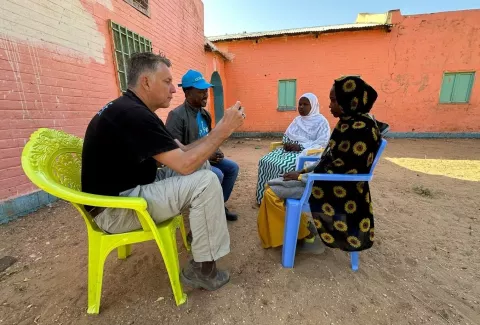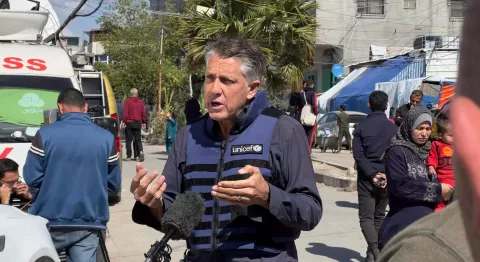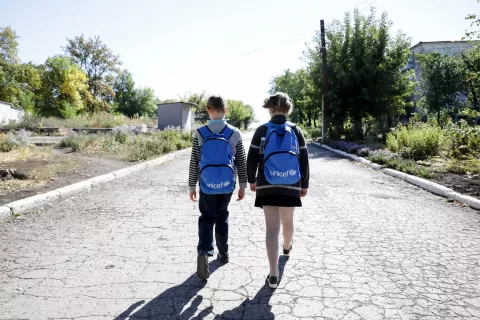Afghanistan has mostly disappeared from the global news cycle, but the hardship faced by its people, especially children, has worsened over the last two years.
I wanted to see the situation for myself, and how our colleagues have adjusted their efforts under the new circumstances. For a week I travelled the breadth of Afghanistan, from Herat in the west to Torkham on the eastern border with Pakistan. I met mothers, children and young volunteers who are striving to improve the lives of their fellow Afghans. I saw suffering and desperate poverty. But what struck me most of all was the hospitality and resilience of the Afghan people. They do not give up, and we should not give up on them.
This is my field diary.
Herat: After the earthquakes
Inside the tent, it’s so quiet you could hear a pin drop. Fifteen adolescent girls watch me expectantly. It’s been a while since I’ve spoken Farsi – a language readily understood by the Dari speakers of Western Afghanistan. I pause, then try again. This time they understand me, and their laughter lights up the place.
The tent we sit in is a temporary learning space. It’s a few hundred metres from the remains of a school that, like the rest of this village, was flattened by the three major earthquakes that struck Herat Province in October.
Today, the village looks like a moonscape. Houses in Western Afghanistan are typically built of mud and straw, packed into neat bricks. When the earthquakes hit, they crumbled, leaving thousands of families homeless, including the 150 families who live here in Karnail. I can’t help but feel uneasy as we walk among these remains: around 1,500 people died in the earthquakes; 17 of them in this small village. The majority were women and children.

Life in Karnail village now goes on under canvas. Survivors who lost everything now live in tents on cleared patches of land beside the remains of their homes, battered by strong winds and frozen by subzero nighttime temperatures. And it’s not even winter, yet.
Naseema and two of her children are sitting outside the tent which now serves as their family home, warming themselves in the midday sun. It’s not just about the homes lost. The things we all rely on for everyday life – clean water, schooling, health care, decent sanitation – were obliterated by the tremors. Naseema says that the lack of sanitation is the thing that gets to her most. Her family of six shares one latrine with five other families. In a few months, the warmer spring weather will be accompanied by a higher risk of acute watery diarrhoea, and the attendant danger of malnutrition.
The damage caused by the earthquakes is not just material; the demand for counselling services has mushroomed. Some of the girls I met in the learning space lost friends, brothers, sisters, mothers – all buried in the rubble. What they just lived through leaves deep scars, some of which may never fully heal. It’s yet one more harrowing event piled on the deprivation and hardship.

The girls I meet in the tent this morning are bright, vivacious, full of life. They have hopes for the future, like adolescents everywhere – like my own kids. These are the everyday tragedies of Afghanistan.
UNICEF is providing a full range of services – health care, nutrition, trucked water, latrines, improvised schools, child-friendly spaces and counselling services – but what the residents really need is for their village, and their community, to be rebuilt. Investing in every member of the community is crucial. To do so, the people of Karnail – and across Afghanistan – need sufficient funding to cover their basic needs and to build resilience to the hardships and risks they face.
Torkham border: Families returning from Pakistan
Baby Kolsum pulls a face when I drop the polio vaccine in his mouth. The fight against polio was where my UNICEF career began, and my heart was set on successfully vaccinating one of the kids returning from Pakistan at the Torkham border crossing today.
I ask for another try. A second baby boy, Shabir, his tiny body swaddled in warm blankets, is more cooperative than Kolsum, and swallows the drops right away.
Two-month-old Shabir crossed the border from Pakistan last week with his parents and three older siblings. The family comes from a village close by, in Nangarhar Province. But like so many others they’re now living in the temporary camp that was hastily erected for families with nowhere to go.
Since the start of October, more than 400,000 Afghans have returned from Pakistan, the country that many of them have called home for years, if not decades. Returning families have lost jobs, homes and possessions, and arrive at the border disoriented, many of them not sure where to go or what to do next.
A satellite UNICEF operation has run in Torkham for years, to cater for the needs of the small local population. In under two months, a full humanitarian operation has bloomed in this dusty mountain pass – a testament to collaboration, quick thinking, and sheer hard work.
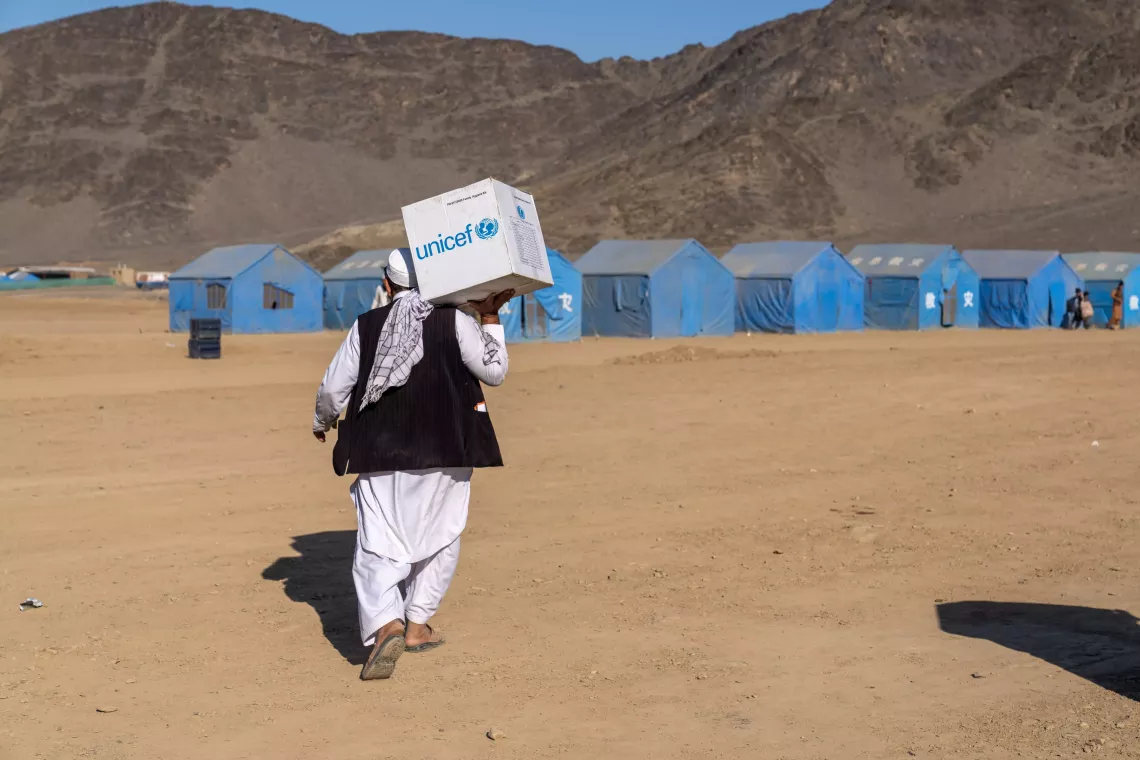
A clinic sits beside the neat rows of blue tents that are the temporary home for families like Shabir’s. Supplies were dispatched to Torkham quickly through the World Bank-funded Health Emergency Response project, or HER, making scale up relatively straightforward. The clinic is efficient, well stocked and running smoothly. There’s even a small delivery room, where the first baby was born last week.
Up here in the mountains, the water table is a hundred metres down, and solid rock all the way. Getting fresh, clean water to the growing population of Torkham means days of jackhammering through granite to sink a borehole. The good news is that the local community will have a clean water supply for years to come. The bad news is that it’s not fast, so lines of water tanks provide a stopgap. Clean water and bars of soap – these are the small things that save lives.

The main road through Zero Point is thronged with men waiting patiently in line to register their family’s return. A few weeks ago, this orderly queue was a scrum, as thousands crossed every day. Numbers have tailed off for now, as people hunker down for winter. Numbers are expected to rise again in the spring.
But even as numbers dwindle, the experience can be confusing for children, and some get lost in the crowd. These children are brought to a UNICEF-supported drop-in centre, where they are cared for while their families are traced. It doesn’t usually take long for a family member to come to take their child home.
Noorullah is one of the lost boys. He was separated from his family in the throng of people and crossed into Afghanistan alone. His family are still in Pakistan, but he has an uncle living nearby, who will come for him the following day. In the meantime, 12-year-old Noorullah waits patiently. He’s being extraordinarily brave – I can’t imagine waiting alone like that.
Waiting on the tarmac at Jalalabad airport the next morning, my thoughts linger on Noorullah and the other kids in Torkham. What will their futures hold when they move on from the rows of blue tents?
Daikundi: Supporting communities on health, nutrition and education
Daikundi Province is perched among the jagged peaks of Afghanistan’s central highlands. Buffeted by crosswinds, the little Kodiak plane comes in to land on a flat piece of land the length of two football pitches.
We drive deeper into the mountains, past mud-bricked villages, women shouldering bundles of firewood, and boys herding shaggy goats. When the mountain road peters out, we set off on foot to meet Fatima, the local community health worker. She is the closest thing to a district nurse for around 120 families on this remote mountainside. This isn’t even her day job – Fatima is a teacher in the village school. Her commitment is awe-inspiring: at 29 years-old, she’s had this role for a decade.
Sitting in her warm house, the sun spilling in through the windows, I ask Fatima why she does this. “I do this for my community – for the people,” she says. “I can’t make everything better, but I can lessen their burdens.” I have rarely been more touched than by Fatima’s sincerity and sense of service.
There are currently around 30,000 community health workers across Afghanistan, trained and resourced by UNICEF. The health posts that they run – often from their own homes, like Fatima – bring health care into remote communities. They run what is essentially a triage service, treating minor ailments and referring more serious illnesses to the closest health centre.
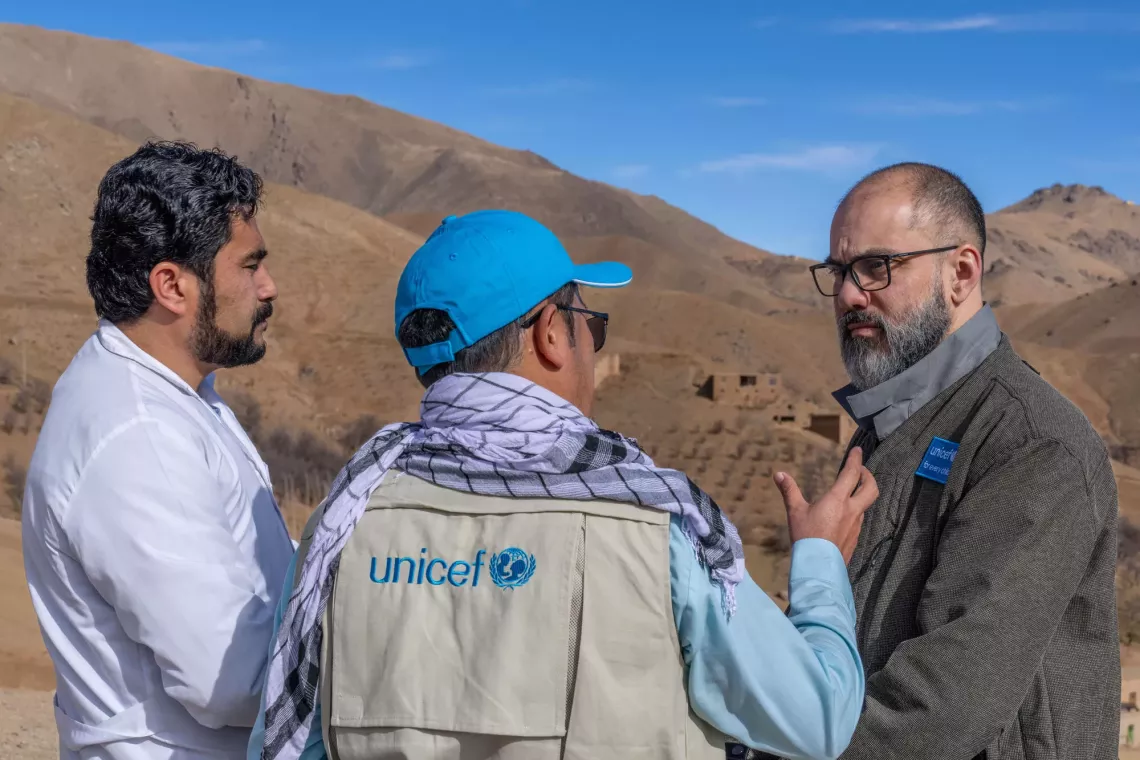
There are common, seasonal trends in the health complaints in Daikundi: respiratory tract infections in the winter, acute watery diarrhoea in the summer, and malnutrition all year round. Malnutrition is soberingly common, and severe cases are referred to the hospital in the provincial capital, Nili.
The spectre of malnutrition haunts not just Daikundi, but most of Afghanistan. UNICEF treated 700,000 Afghan children for severe malnutrition this year. It’s not just children who are affected: the tiny babies in the inpatient clinic in Nili are all there because their mothers were themselves too malnourished to breastfeed.
The closest health centre to Fatima’s home is a half-hour drive away. Nili hospital is another two-hour drive, over unpaved roads. Like the clinic at Torkham, they are run under the HER project.

In the warmth of a wood-burning stove in Shish health centre, Dr Sultan explains the situation. “These illnesses are interconnected,” he tells me. “People are poor and not well fed, so they are often malnourished. In the winter, they heat their homes by burning wood, and breathe in the smoke. You see – at the root of everything, is poverty.”
The majority of people in Daikundi Province live below the poverty line. UNICEF provides health care and nutrition therapy, but despite the best efforts of Fatima and her fellow community health workers, malnutrition rates are increasing. This is a simple causation: basic human needs like clean water, a varied diet and sanitation are going unmet because people are living in poverty.

Without more funding to cover these basic needs, Fatima is fighting a losing battle. She knows she won’t solve the problems in her community, but she does know what to ask for: more community health workers, more resources, more training.
Afghanistan needs more Fatimas. Quite frankly, the world does.
On our second day in Daikundi, I find myself sitting in front of an orderly class for the second time this week. Thirty-two children aged between 7 and 9 years-old sit in four neat rows: two lines of girls, and two of boys. After a week of practice, I’ve dusted off my Farsi, and thirty pairs of bright eyes light up as I try to crack a few jokes.

The children knew we were coming, and several had prepared poems and songs. Nine-year-old Zahra walks to the front of the class to recite a poem she has learned by heart, moving her fingers delicately to the beat of the verse. A boy sings a song about UNICEF, much to our surprise and delight. This is all the encouragement the kids need, and there’s a second rendition. This time, the whole class joins in.
In Afghanistan, more than 2 million primary school aged children are out of school. In remote parts of the country, geography can be a major obstacle: here in Daikundi, for example, people live in little hamlets strung out along precipitous mountainsides.
UNICEF’s community-based education classes are a lifeline, providing decent education to children who live far from the closest school, and might otherwise miss out. Countrywide, UNICEF supported over 18,000 community-based education classes in 2023, keeping close to 600,000 children learning – more than half of them girls.
Schools are not just places of formal learning. They are a space where children can play together, make friends, fall out and reconcile, and generally learn how to rub along together. Schools keep kids safe from harm and prepare them to become fully-fledged contributors to society.
The importance of what children learn within these four walls – girls as well as boys – cannot be underestimated for the future of Afghanistan.
Naysán Sahba is the Director of Division of Global Communication and Advocacy.
Afghanistan is home to one of the most crushing humanitarian crises in the world. After decades of conflict, Afghans have been cut off from the global community, left to grapple with economic collapse, climate disasters and human rights violations. Click here to learn more about the situation and UNICEF’s response.



